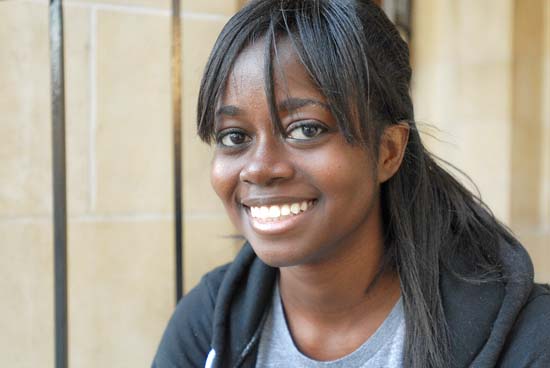In high school, Joelle Gamble wanted to eliminate Styrofoam.
She was concerned about the possible dangers of heating food in Styrofoam containers, the only containers offered in the cafeteria.
As a member of the Associated Student Body, she decided to start a petition to protest for alternatives, but the administration shut it down.
As a result, she arrived at UCLA with a desire to get involved in politics and policy work.
She joined the Roosevelt Institute Campus Network, an organization that bills itself as the “nation’s first student think tank” and aims to give students the resources to engage in policy-making practices.
“I thought it was really cool because … I had this opportunity to make a difference before I (even) graduated,” Gamble, current co-president of the UCLA branch, said.
“(We’re not) just regurgitating information we learn, but instead we’re coming up with our own ideas.”
The entirely student-run UCLA branch was created last winter by two politically inclined seniors, said Brent Gaisford, second-year economics student and fellow co-president.
Although the fledgling chapter is only a year old, the group leaders have high expectations for this quarter.
Not only are the UCLA members looking to get their work published in Roosevelt publications, but they are also trying to get the attention of lawmakers and influential community members.
“I’m super confident that at least one UCLA student will be published, and I feel like that will give credibility to the work all of us are doing,” said Erika Solanki, a second-year political science student and the Institute’s Western regional coordinator.
The 30-odd members are working on a variety of issues for publication, from the controversial “Don’t Ask, Don’t Tell” military policy to transportation problems in Los Angeles.
Gamble is personally researching cyber security issues in the U.S., while Gaisford is deeply involved with prison reform.
After reading some articles, he realized that private prisons do not offer better care and are usually more expensive if they do not face competition from public prisons.
Thus, Gaisford’s proposal is to introduce constant competition between private and public prisons to improve the standards of care.
“The idea is that all of the state’s prisons would be ranked on the quality of care that they provide for their inmates and on how expensive they are per prisoner,” Gaisford said.
“Then the most expensive prisons to run and those that are providing the worst care every year would lose the right to operate that prison … and then the ownership is turned over to another entity that can run it better.”
To strengthen his idea, Gaisford approached Gov. Arnold Schwarzenegger’s office, the California Department of Corrections and Rehabilitation and the Office of the Inspector General, which is responsible for ensuring that prisons are up to standard.
While he faced some defensiveness from these organizations originally, he was eventually able to illustrate the validity of his project.
“Both of the people I talked to (at the Office of the Inspector General and the Department of Corrections) thought it was a very good idea and not impossible to implement,” Gaisford said.
Despite Gaisford’s enthusiastic explanation, he said he remains practical about the limitations of this project.
“The greatest challenge is that we’re just students and trying to get policy implemented is very, very difficult,” he said. “I certainly don’t think that the odds are with me with getting anything actually accomplished, but I’ll keep trying.”
Besides preparing policy memos, the group is also hosting United Nations Information Center Director William K. Davis, who will be speaking at UCLA on Jan. 28.
In addition, the chapter spearheaded the plans for a California Policy Expo in May and will be inviting legislators and aides to listen to its proposals.
Although the group leaders have quite a few challenges ahead of them, they still enjoy the experiences they have collected from their work and hope they can make an impact in legislation.
“If I got a call from a lawmaker in Alabama or something who thought my idea was great, that would be phenomenal ““ the best possible outcome,” Gaisford said.
With reports from Iris Chen, Bruin contributor.
